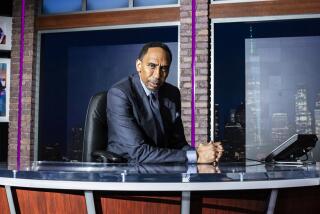Changing Channels
- Share via
When Stephen Chao was in charge of developing shows for the Fox television stations in the early ‘90s, he once so enraged his boss Barry Diller that Diller hurled a videocassette tape across the room, leaving a huge gash in the wall.
The two executives didn’t speak for months, but Chao survived the blowup--and was even promoted months later. He even convinced Diller to sign the wall after Chao hung a frame around the scar, turning it into a work of art that hangs in Chao’s garage today, years after he was unceremoniously fired from Fox in 1992 for hiring a stripper to perform at a company management retreat.
Outrageous and defiant acts are among the earmarks of the 42-year-old Harvard MBA, who revels in shaking up the establishment and who fancies himself too cool to conform to industry conventions, much less act like a corporate “suit.”
Outspoken and opinionated, Chao is among the few Hollywood executives brazen enough to go toe-to-toe with the abrasive Diller. And his programming talents--he rewired prime-time economics with innovative shows such as the fugitive docudrama, “America’s Most Wanted”--are valued by Diller.
So it came as little surprise--and was greeted mainly with approval--last month when Diller named him president of programming and marketing for USA Networks.
Chao and Stephen Brenner, a capable 16-year veteran of the company who was named president of operations, step into the void left by USA Networks founder Kay Koplovitz, who Diller swept aside after his purchase of the network and its sister Sci-Fi Channel from Universal Studios Inc. in February.
During the last six years, Stephen Chao Inc. has turned out a few network specials, including one for ABC that staged silly car accidents. The company consulted for Diller in his previous incarnation as head of QVC, creating a spinoff channel that went up in smoke with Diller’s departure.
“He wasn’t as successful on his own as you’d think,” said former Fox boss Greg Nathanson, president of television for Emmis Broadcasting Corp. “He’s brilliant. He sees things differently than most and has a very analytical mind. But he is not a salesman type and probably works better when other people do the selling.
Chao, who started his job last week, says the rap against USA Network--for a hodgepodge of programming that critics say blurs its identity--is unfair. “Based on its ratings, it couldn’t be doing so badly,” Chao said.
He has a particular soft spot for the popular World Wrestling Federation, which keeps USA consistently among the nation’s top-rated cable channels. “My grandmother was this Chinese lady who came to America late in life with a heavy accent--a straight and proper woman who responded to nothing in American culture except the WWF and Bobo Brazil [the wrestler who died this year at age 74]. She liked the theater of it.”
Chao’s programming is informed by a life without boundaries. Part court jester, part prankster, he has a childlike fascination with breaking rules and for the morbid, lurid, raunchy and silly sides of life, which he seeks to experience first-hand. In his wake is a collection of bizarre vignettes: his trashing of rental cars left along the roadside when he was a reporter at the National Enquirer and adolescent behavior like faking sleep in Hollywood pitch meetings.
The descendant of a wealthy pre-revolutionary Chinese family, friends say Chao chose to live in a poor area of New York after graduating from Harvard with a degree in the classics. After being fired from Fox, he worked briefly at a McDonald’s in Redondo Beach. He drives a beat-up maroon Volvo and lives in Venice with his wife, Irina, and their two boys, ages 4 and 7. He bought a building for his production company in an offbeat artists’ strip of converted warehouses in Santa Monica formerly occupied by defense contractors.
“It’s nice to be curious, fascinated and easily amused,” Chao said. “My grandfather [a former Chinese economic minister to the U.S.] was endlessly involved in what he called social investigation and spent a lot of time trying to find out whether there was cannibalism in China. I consider myself a social investigator with a National Enquirer curiosity, although I hope I use some editing filters in my work.”
Bright, antagonistic and “dangerously manipulative,” according to one Hollywood insider, Chao made a name for himself with raw, provocative, tabloid-like shows such as “Cops,” “America’s Most Wanted” and the dating game “Studs.” Critics call him sensationalistic and say he plays to the lowest common denominator. They doubt he’ll do much to clean up USA’s reputation for exploitative fare.
“I’m not into gratuitous and sleazy stuff,” countered Chao. “It always comes from a point of view you’ve never seen.”
Chao has a loyal core of fans who consider him an innovator and are impressed by the mountains of money he made for Fox.
“Stephen Chao is one of the most interesting people I know,” Diller said. “He has an instinctive, contrarian program sensibility.”
TV executives who worked at Fox with Diller and Chao say the two thrived on arguing. Chao calls Diller “hilarious and lots of fun to work with” and says he responds well to Diller’s “Socratic” style.
Yet Chao is offensive to many, and his off-the-wall behavior put him on thin ice more than once with Anna Murdoch, the wife of his mentor Rupert Murdoch, chairman of Fox’s parent, News Corp. Several years back, Chao nearly drowned Anna’s cherished purebred puppy in the pool at the Murdoch’s Los Angeles residence.
“They said it was a hunting dog with webbed feet for swimming, so I said, ‘Let’s see it swim’ and threw the dog in,” explained Chao. “It sunk like a rock, disappearing into the slate-gray bottom of the pool like the Titanic. No bubbles were coming out of its nose--the dog was motionless. Everyone just froze. I jumped in I think with all my clothes on and rescued the dog. It was surreal.”
He said Rupert was amused, but others say Anna was not.
Murdoch saw star-quality in Chao. “I think the combination of Latin and the National Enquirer intrigued him,” said Chao, who worked at the supermarket tabloid for two years between Harvard degrees. Initially, Chao undertook such tasks for Murdoch as writing News Corp.’s annual report and crunching numbers for his purchase of Twentieth Century Fox and the Metromedia station group.
When Chao wanted to move into programming, Murdoch sent him to Los Angeles to develop television sitcoms. He developed “America’s Most Wanted,” whose ratings success ushered in a wave of imitators.
But Fox’s programming wunderkind abruptly flamed out. Just weeks after a big promotion to president of the Fox Television Stations, Chao was fired in what became the most talked-about Hollywood scandal of 1992.
At a retreat in Snowmass, Colo., for Fox executives, board members and world dignitaries, Chao spoke on a panel entitled “The Threat to Democratic Capitalism Posed by Modern Culture.” To illustrate his point about how network standards were not keeping pace with modern-day experience, Chao hired a local man to disrobe on stage. Those in attendance say Chao made matters worse by taunting Anna Murdoch, seated beside her husband and then-Secretary of Defense Dick Cheney, in the front row, not to turn away her eyes.
Anna demanded Chao’s dismissal, and Murdoch obliged.
Chao says he decided to return to corporate life because of Diller, who “nurtures original voices,” Chao said. In contrast, he says, most programs on the air today are overdeveloped and therefore diluted. He says he appreciates NBC’s “Homicide: Life on the Street” for its direction and look, and Comedy Central’s “South Park” for its “rare form and pure voice.” He said he’d rather his two boys watch the unfiltered version of “The Jerry Springer Show” than the 11 p.m. news.
More to Read
The biggest entertainment stories
Get our big stories about Hollywood, film, television, music, arts, culture and more right in your inbox as soon as they publish.
You may occasionally receive promotional content from the Los Angeles Times.










